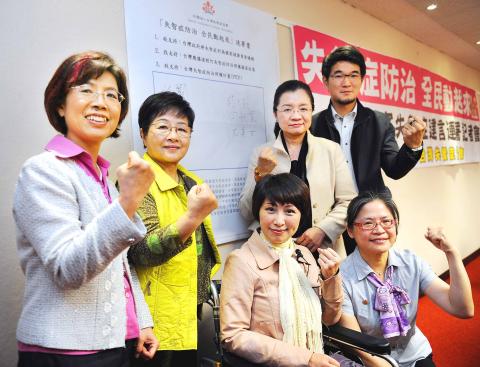The nation still lacks a proper national plan for the prevention and treatment of Alzheimer’s disease, the Taiwan Alzheimer’s Disease Association (TADA) said yesterday.
The association said the number of people in the nation with the disease has risen to about 200,000 this year and could reach 720,000 by 2056.
In advance of the 28th International Conference on Alzheimer’s Disease, which is scheduled to be held in Taipei from April 18 through April 20, the association launched a petition urging the government to list the disease as a national health issue and to take its “Taiwan Dementia Plan” — a national strategy proposal addressing Alzheimer’s disease and its effects researched and recommended by TADA — seriously.

Photo: Fang Pin-chao, Taipei Times
Association secretary-general Tang Li-yu (湯麗玉) said that as the country rapidly ages and the number of people with Alzheimer’s grows, it is estimated that there could be four Taiwanese in every hundred suffering dementia by 2056.
“The South Korean government recently started to address this problem, but we still don’t see any concrete progress from our own government,” Tang said.
TADA’s Taiwan Dementia Plan sets out some major goals concerning the four dimensions of prevention, treatment, care and protection, emphasizing the importance of a coordinated approach and an overhaul of current policy.
Five lawmakers from the two major parties were also present to sign the petition, and commented on the dire situation sufferers of the disease and the nation as a whole are facing.
Democratic Progressive Party (DPP) Legislator Chen Chieh-ju (陳節如) said daycare centers for the elderly are not specialized enough to separate those with dementia from those with other problems, and the necessary funding from the central government for the establishment of specialized care centers is lacking.
More government campaigns to raise public awareness of the disease, its effects and possible treatments or methods of prevention are needed, DPP Legislator Yu Mei-nu (尤美女) and Chinese Nationalist Party (KMT) Legislator Yang Yu-hsin (楊玉欣) said.
Fu Chung-ling (傅中玲), a neurologist at Taipei Veterans General Hospital, said that possibly due to a lack of awareness, only about 30,000 people, out of the estimated 200,000 suffering dementia, have the government-issued handbook for people with disabilities.
DPP legislators Liu Chien-kuo (劉建國) and Tien Chiu-chin (田秋堇) said the government has been merely focusing, with little success, on the aspect of care for people with the disease, while what it should be doing is expanding its coverage to incorporate all four dimensions of the disease and set up a cross-ministry group to address the issue and address the impending Alzheimer’s crisis.

A magnitude 4.9 earthquake struck off Tainan at 11:47am today, the Central Weather Administration (CWA) said. The hypocenter was 32.3km northeast of Tainan City Hall at a depth of 7.3km, CWA data showed. The intensity of the quake, which gauges the actual effect of a seismic event, measured 4 in Tainan and Chiayi County on Taiwan's seven-tier intensity scale, the data showed. The quake had an intensity of 3 in Chiayi City and County, and Yunlin County, while it was measured as 2 in Kaohsiung, Nantou County, Changhua County, Taitung County and offshore Penghu County, the data showed. There were no immediate reports of

The Chinese Nationalist Party (KMT) is maintaining close ties with Beijing, the Democratic Progressive Party (DPP) said yesterday, hours after a new round of Chinese military drills in the Taiwan Strait began. Political parties in a democracy have a responsibility to be loyal to the nation and defend its sovereignty, DPP spokesman Justin Wu (吳崢) told a news conference in Taipei. His comments came hours after Beijing announced via Chinese state media that the Chinese People’s Liberation Army’s Eastern Theater Command was holding large-scale drills simulating a multi-pronged attack on Taiwan. Contrary to the KMT’s claims that it is staunchly anti-communist, KMT Deputy

RESPONSE: The government would investigate incidents of Taiwanese entertainers in China promoting CCP propaganda online in contravention of the law, the source said Taiwanese entertainers living in China who are found to have contravened cross-strait regulations or collaborated with the Chinese Communist Party (CCP) could be subject to fines, a source said on Sunday. Several Taiwanese entertainers have posted on the social media platform Sina Weibo saying that Taiwan “must be returned” to China, and sharing news articles from Chinese state media. In response, the Mainland Affairs Council (MAC) has asked the Ministry of Culture to investigate whether the entertainers had contravened any laws, and asked for them to be questioned upon their return to Taiwan, an official familiar with the matter said. To curb repeated

Taiwan has recorded its first fatal case of Coxsackie B5 enterovirus in 10 years after a one-year-old boy from southern Taiwan died from complications early last month, the Centers for Disease Control (CDC) said yesterday. CDC spokesman Lo Yi-chun (羅一鈞) told a news conference that the child initially developed a fever and respiratory symptoms before experiencing seizures and loss of consciousness. The boy was diagnosed with acute encephalitis and admitted to intensive care, but his condition deteriorated rapidly, and he passed away on the sixth day of illness, Lo said. This also marks Taiwan’s third enterovirus-related death this year and the first severe